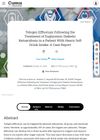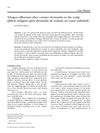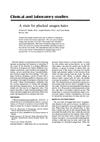 2 citations,
January 2017 in “Journal of Pigmentary Disorders”
2 citations,
January 2017 in “Journal of Pigmentary Disorders” Vitiligo causes white skin patches and can lead to psychological stress.
 January 2019 in “ARC journal of pharmaceutical sciences”
January 2019 in “ARC journal of pharmaceutical sciences” Acne can be managed with various treatments and requires psychological support due to its emotional impact.
 3 citations,
June 1999 in “Seminars in Cutaneous Medicine and Surgery”
3 citations,
June 1999 in “Seminars in Cutaneous Medicine and Surgery” Hair transplantation can effectively treat female pattern hair loss with the right patient selection and surgical skill.
 5 citations,
January 2017 in “Clinics in Dermatology”
5 citations,
January 2017 in “Clinics in Dermatology” Skin symptoms without a medical cause often reflect psychological stress and are influenced by culture, requiring a team approach for treatment.
 January 2007 in “Elsevier eBooks”
January 2007 in “Elsevier eBooks” Alopecia areata is a reversible, autoimmune-related hair loss that can have significant emotional impact and uncertain treatment effectiveness.
 40 citations,
May 2020 in “Cureus”
40 citations,
May 2020 in “Cureus” The conclusion is that treatments for Telogen Effluvium exist, but standard treatment guidelines are needed.
 119 citations,
January 2012 in “Nutrition & Metabolism”
119 citations,
January 2012 in “Nutrition & Metabolism” Modern lifestyles, including poor diet, stress, and long-term use of certain medications, hinder the body's ability to heal from inflammation, leading to chronic diseases.
 February 2021 in “Journal of pharmaceutical and biological sciences”
February 2021 in “Journal of pharmaceutical and biological sciences” No cure exists for alopecia areata, and treatments are personalized.
137 citations,
January 2006 in “Frontiers in bioscience” CRH in the skin acts like the body's stress response system, affecting cell behavior and immune activity.
January 2016 in “Çağdaş tıp dergisi” Topical 1% pimecrolimus effectively treated alopecia areata.
 March 2024 in “Journal of biobased materials and bioenergy”
March 2024 in “Journal of biobased materials and bioenergy” Tea tree oil may help treat scalp alopecia by promoting hair follicle stem cell growth.
17 citations,
August 2018 in “Clinics in Dermatology” Skin and hair-picking disorders are common and need both skin and mental health treatments.
 43 citations,
August 2014 in “Dermatologic Therapy”
43 citations,
August 2014 in “Dermatologic Therapy” Minoxidil response testing helps treat hair loss effectively and safely.
 January 2022 in “Clinical Cases in Dermatology”
January 2022 in “Clinical Cases in Dermatology” Lack of certain nutrients may contribute to hair loss and proper diet or supplements could improve it.

Hair loss can occur after treating diabetic ketoacidosis, especially with rapid weight loss and high soft drink intake.
 January 2018 in “Haydarpaşa Numune Hastanesi tıp dergisi”
January 2018 in “Haydarpaşa Numune Hastanesi tıp dergisi” The paper concludes that detailed patient history, skin exams, and lab tests are crucial for diagnosing and treating hair loss from diffuse alopecia.
A new lipid-based formula using myristyl myristate can improve estradiol treatment for hair loss.
 October 2024 in “Annals of Allergy Asthma & Immunology”
October 2024 in “Annals of Allergy Asthma & Immunology” Anaphylaxis from cow's milk allergy can cause temporary hair loss in children.
105 citations,
March 2006 in “Human reproduction” Metformin improves quality of life, emotional health, and sex life in women with polycystic ovary syndrome.
 2 citations,
August 2022 in “Clinical Case Reports”
2 citations,
August 2022 in “Clinical Case Reports” A 17-year-old girl had severe, on-and-off hair loss, likely due to COVID-19. She was treated with Vitamin D3, biotin, and other supplements, and saw some improvement within a month.
 1 citations,
August 2021 in “Internal Medicine Journal”
1 citations,
August 2021 in “Internal Medicine Journal” After severe COVID-19, 71% of patients experienced excessive hair shedding and thinning within 3 months due to factors like low oxygen levels, medication, stress, and autoimmune disease.
2 citations,
January 1996 in “Annals of saudi medicine/Annals of Saudi medicine” Alopecia areata is unpredictable, with limited treatment effectiveness, especially in severe cases.
 2 citations,
June 2022 in “International Journal of Biomedicine”
2 citations,
June 2022 in “International Journal of Biomedicine” The review suggests a comprehensive approach to treat hirsutism, focusing on hair removal, medication, and managing emotional effects.
 43 citations,
July 2020 in “Dermatologic Therapy”
43 citations,
July 2020 in “Dermatologic Therapy” During the COVID-19 pandemic, a clinic in Turkey saw fewer patients but more cases of certain skin conditions, possibly linked to the virus and stress.
 34 citations,
March 2001 in “Cleveland Clinic Journal of Medicine”
34 citations,
March 2001 in “Cleveland Clinic Journal of Medicine” Manage hair shedding by identifying triggers, possibly using supplements or medications, and tracking with a health calendar.
 88 citations,
June 2009 in “Cleveland Clinic Journal of Medicine”
88 citations,
June 2009 in “Cleveland Clinic Journal of Medicine” To manage diffuse hair loss, identify the cause, improve nutrition, remove triggers, and use specific treatments like minoxidil or finasteride.
13 citations,
September 2022 in “Frontiers in immunology” Ifidancitinib, a JAK inhibitor, effectively regrows hair in mice with alopecia by tiring out harmful T cells.

A patient experienced intense hair loss due to telogen effluvium after scalp contact dermatitis, but hair regrew completely within two months without further treatment.
 17 citations,
August 1979 in “Journal of The American Academy of Dermatology”
17 citations,
August 1979 in “Journal of The American Academy of Dermatology” A new staining method helps tell growing from resting hairs to diagnose hair loss.

Alopecia areata often starts around age 23, can be permanent in 30% of cases, and treatments are usually temporary.























